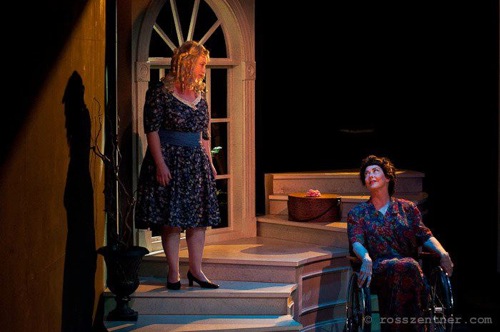When two aging female stars try to revive their fading Hollywood careers, the results can be hilarious. Such a comedy is Don Nigro’s Gorgons. A production of Gorgonsopens Renaissance Theaterworks’ fall season. The two-character show is performed in the intimate, black box performing space in Milwaukee’s Broadway Theatre Center. It is a superbly constructed, close-up setting to observe this battle between divas.
The play’s title is derived from Greek mythology. (i.e., be wary of women whose heads sprout snakes). It is also the title of a fictitious film that brings the two actresses together.
As the play opens, the elegantly dressed Ruth (played by Jennifer Rupp, the company’s co-artistic director) stops backstage after a play to congratulate her colleague, Mildred (Marcella Kearns). Her overly dramatic entrance alerts the audience to what is ahead. Soon, the conversation deteriorates into a series of vicious swipes. “Why are you here?” asks Mildred, suspiciously, as she wipes away her stage makeup. “Do you need a kidney?”
Unfazed by this remark, Ruth talks excitedly about a film script that she is convinced will launch a comeback for both of them. The script calls for two women who would play demented sisters. If this makes the audience think of Bette Davis and Joan Crawford, all the better. (The film, “Gorgons,” is a thinly veiled version of, “Whatever Happened to Baby Jane?”) Mildred responds by tossing a few more barbs at Ruth, such as “you’ve slept with every male in this town except Lassie.” However, she agrees – reluctantly - to read the script.
Fast forward to the film set. Ruth is confined to a wheelchair, with a blanket tucked around her legs. Mildred dresses like a schoolgirl and wears hideously garish makeup. In a childlike voice, Mildred talks about her former suitors. Ruth plays along, noting that one of the suitors has left a wrapped “gift” for Mildred. Of course, the “gift” turns out to be something awful, befitting an old-style horror film.
Between movie takes, the women sometimes let down their armor to talk openly with each other. They discuss the following topics: aging, Hollywood, theater, directors, ex-friends, ex-husbands and their own children. When Ruth admits that “my children hate me,” one instantly thinks of the yet-to-be published book, “Mommie Dearest.” During these “heartfelt” talks, the women use terms that would make a sailor blush. Their “unladylike” language in real life is in stark contrast to the lines of dialogue they must say for the film. It makes the play all the funnier.
However, things go haywire in the final scenes. The playwright has missed an incredible opportunity to end the play after Ruth’s humorous acceptance speech at the Academy Awards. Her speech is a wonderful spoof of all those long, gushy speeches at TV awards shows. Instead of finishing the play here, the playwright forces Mildred and Ruth into one final conflict. Mildred, unfortunately, has to act intoxicated for what seems like an incredibly long time. Her alcohol-fueled behavior results in a violent act at the end of the scene. It is unfortunate that such a well-scripted play has to finish on such an offbeat note.
As Ruth and Mildred, Jennifer Rupp and Marcella Kearns use their acting chops to full advantage. With the assistance of Drew Brhel’s direction, they manage to keep the tension between the two actresses at full throttle. Their comic timing is excellent throughout. Some of their more “serious” dialogue is thought-provoking as well. One almost becomes sympathetic to their typical Hollywood story. These are women who sacrificed personal relationships for their careers and fleeting fame. They will always be remembered by generations of moviegoers, but at what price?

